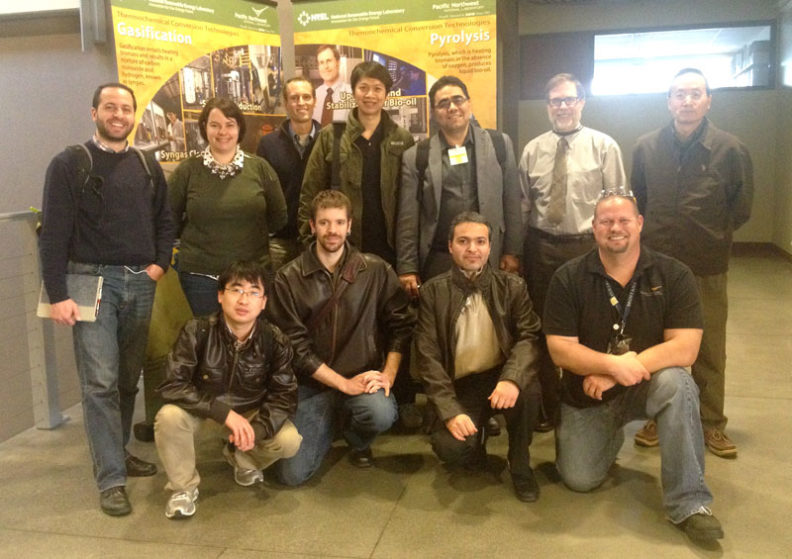Overview for My Students
As the importance of biomass for fuels, chemicals, building materials, and clothing continues to increase, students must learn how to integrate thermal, biological, chemical and mechanical conversion approaches that utilize these resources.
“University professors must be motivators and use available opportunities to tell stories of success and to introduce great researchers and business people as models. We must also recognize the achievements of our students and encourage them to work for their dreams,”

Mr. Douglas Elliot (PNNL) with Dr. Garcia-Perez’s group during a visit to PNNL.
His dedication to graduate education shows in the students he advises, the graduate committees he serves on, and the focus he brings to the classes he teaches..
Dr. Garcia-Perez currently advises four graduate students and serves on two graduate committees.
For graduate study research opportunities, please contact Dr. Garcia-Perez directly.
BSysE 551 – Advanced Biological Systems Engineering Topics
Overview:
This class deals with Biomass Thermochemical Conversion Technologies.
Objectives:
Develop a thorough understanding of how the biomass chemical composition (content of cellulose, hemicelluloses, lignin, proteins and triglycerides) influences the outcome of Thermochemical processes.
Use analytical techniques based on Thermochemical phenomena (Py-GC/MS, Thermo-gravimetric analyses, differential scanning calorimetry) to characterize bio-materials (cultural materials, environmental samples, examination of forensic evidentes).
Understand how to study and evaluate the following biomass Thermochemical reactions: (1) primary reactions in solid phase, (2) secondary intra-particle reactions, (3) secondary extra-particle reactions and (4) secondary homogenous reactions in vapor phase.
Learn how to collect, analyze and present data of primary and secondary Thermochemical reactions to obtain kinetic parameters needed to design Thermochemical reactors.
Gain practical skills to design fluidized beds Thermochemical reactors (pyrolysis, gasification and combustion reactors)
Schedule:
Class Schedule information can be found on our Department Web Site.
Lectures:
All Class Information including lectures is located on our Dept. SharePoint site.
BSysE 594 – Advanced Topics In Bio-Processing & Bio-Treatment
Overview:
This class deals with Analysis and Design of Processes and Systems for Biomass Conversion
Objectives:
To develop a thorough understanding of the relationship between Biomass Composition and the Technologies to Convert these Feedstocks into bio-fuel and Chemicals.
To understand the reactions and structural modifications happening when biomass molecules (cellulose, hemicellulose, lignin, protein and triglycerides) are subjected to the action of thermal, biological, mechanical and chemical agents.
To introduce the students to some of the existing technologies for biomass conversion (Chemical Conversion: Pulp and Paper, Sugarcane, Furfural, Corn Wet Milling, Bio-diesel, Biological Conversion: Fermentation and Enzymatic hydrolysis, Anaerobic digestion, Composting, Thermochemical Conversion: Torrefaction, Pyrolysis, Gasification, and Combustion, Mechanical Conversion: Production of Particle boards and Mechanical pulping).
To learn a General Strategy to Analyze and Improve biomass conversion technologies.
To learn Systems Engineering skills, techniques and tools to reduce costs and enhance the total quality of biomass conversion technologies (Nominal Groups, Brainstorming, Cause and Effect Diagrams, Pareto Analyses and the six thinking hats, the House of Quality).
To understand the fundamentals of Process Engineering Design.
To perform macroscopic Mass and Energy balances to estimate the yields and conversion efficiencies of biomass conversion technologies and systems.
Schedule:
Class schedule information can be found on our Department Web Site.
Lectures:
All Class Information including lectures is located on our Dept. SharePoint site.